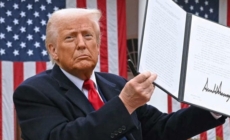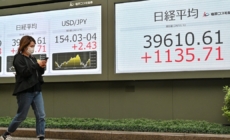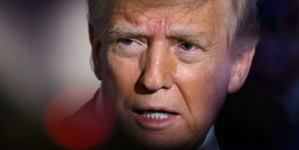-
UFL Top 10 Plays From Week 2 | United Football League - 7 mins ago
-
How to Buy UConn Huskies NCAA National Championship Merchandise: Shirts, Hats, Hoodies - 14 mins ago
-
What’s Next for Duke Star Cooper Flagg After Final Four Loss? - 53 mins ago
-
The Rizzler tossed the first pitch before the Mets beat the Blue Jays on Sunday - 54 mins ago
-
How to Watch Golden Knights vs Canucks: Live Stream NHL, TV Channel - 2 hours ago
-
San Antonio Brahmas vs. St. Louis Battlehawks Highlights | United Football League - 2 hours ago
-
Asian stock markets slide, U.S. futures retreat as tariff turmoil continues - 2 hours ago
-
Donald Trump Addresses Whether He Crashed Markets On Purpose - 2 hours ago
-
Destiny’s Child singer Michelle Williams slams barefoot airplane passenger - 2 hours ago
-
Nebraska Cornhuskers vs. UCF Knights The Crown Championship Highlights | FOX College Hoops - 2 hours ago
The New Energy Security Threat Is the Coming Shortage of Critical Minerals
For decades, U.S. energy security was synonymous with oil. The trauma of the Middle Eastern oil embargo in the 1970s showed a generation of U.S. leaders that dependence on oil imports created a crippling vulnerability for the country’s economy and military.
Today, the U.S. is producing and exporting more oil and gas than any country in the world. But that hasn’t eliminated energy security concerns. Another looming shortage now preoccupies political and military leaders as more of the country’s energy economy depends on electricity, technology and the critical minerals that make it all possible.
“For so many years with oil, we were vulnerable,” Alaska Senator Lisa Murkowski said Wednesday at an energy security conference in Washington. “We’re headed with critical minerals to the exact same place.”
Murkowski is a 20-year veteran of the Senate, and the moderate Republican has earned a reputation as a leading voice on energy issues. She spoke at a summit organized by SAFE, a nonpartisan group started in 2004 to reduce America’s oil dependence. Now SAFE’s annual summit focuses on the supply chains for lithium, cobalt, copper, nickel and other critical minerals and rare earth elements needed for batteries, EVs, electric transmission lines and clean energy technology.
The U.S. produces relatively little of most of those minerals, and China has established control of a large percentage of the current mining and processing, Murkowski warned.
“Until we make that decision that we’re going to reduce our reliance, that we’re going to reduce out vulnerability by doing it on our own, we are setting ourselves up to be in another tough spot,” Murkowski said.
Photo-illustration by Newsweek/Getty
One after another, industry executives and government officials from around the world took to the summit’s stage with dire warnings about a coming lack of critical minerals, China’s dominant control of supplies, and the difficulties involved in starting new mining and processing capacity.
“We are heading toward a serious shortfall of supply,” Sir Mick Davis, managing partner at the U.K. strategic metals company Vision Blue Resources said. Davis echoed recent findings from the International Energy Agency that projected a copper shortage within the decade. “We’re going to need about $500 billion investment in copper alone,” Davis said.
Jeff Hanman, EVP and chief of strategy for the Canadian mining company Teck Resources Limited, said his company is expanding mines but he complained that a burdensome permitting process meant long delays. He estimated that China “has a 30-year head start” in developing mineral supplies.
Principal Deputy National Security Adviser to the Trump White House Alex Wong called the long decline in U.S. government support for mining a “series of self-inflicted wounds” that diminish domestic supply.
“America and our friends must look elsewhere for critical minerals to drive our economy,” Wong said. “The one nation with the advantage is China.”
China has flexed its mineral muscles over the past two years with export restrictions on some rare earth and critical minerals such as graphite, gallium and germanium. President Donald Trump’s announcement Wednesday of stiff new tariffs on products from China and other trade partners raises the specter of retaliatory measures that could further limit access or raise prices on minerals.
The issue is not new, but it is newly salient amid a brewing trade war, growing geopolitical tensions and booming demand for minerals due to the growth of EVs, batteries and other clean energy technologies that depend on critical minerals.
The SAFE Summit was thick with representatives of companies promoting mining possibilities from mineral rich parts of the world, including Ukraine, central Africa and Greenland. One presentation offered the latest research on the potential for mining critical mineral nodules from the deep-sea floor.
Many speakers acknowledged the need for America to better develop relationships with supplier countries, another area where China holds an advantage. But the dominant theme at the summit was a desire to beef up domestic supply.
Charles Williams is global head of business development at Concord Resources Limited, a commodities merchant with a focus on metals and minerals. Williams said, “The market doesn’t work” by itself to overcome the competitive advantages China has, and he made a pitch for Trump and Republicans to keep parts of one of President Joe Biden’s signature achievements, the Inflation Reduction Act.
“The IRA and tax credit system works,” Williams said, singling out the IRA’s production tax credit for clean energy technologies as critical. “We must keep it and not let it become victim of some partisan tit-for-tat.”
Most of the minerals companies presenting at the summit said the top priority should be reforming the U.S. permitting process to speed development of minerals and the construction of energy infrastructure.
A permit-reform effort gained steam early in the last Congress but did not get across the finish line. Proponents see the Trump administration’s deregulatory agenda as an opportunity push through legislation that would streamline what industry calls burdensome regulations and bureaucracy.
However, where industry sees reform others see a wrecking ball for the regulatory system that reined in the environmental and public health damage from mining.
Colorado Democratic Senator John Hickenlooper, a geologist by training, said the nexus between clean energy and critical minerals creates an opportunity for compromise.
“You won’t be able to address climate change without really ramping up critical mineral supply,” Hickenlooper said. More environmentalists now realize that, he said, and are open to simplifying the permitting process for projects that will help speed the clean energy transition.
The national security threat from a critical minerals shortage also resonates on Capitol Hill, he said, making it one of the few issues that can bring together lawmakers from across the aisle.
“It’s unfortunate that there has to be an enemy, an ogre in the room, to get people to act,” Hickenlooper said. He cited the Washington maxim that “a crisis is a terrible thing to waste” because the sense of urgency around a crisis can create moments of opportunity to break partisan logjams.
“Having a national rival is a terrible thing to waste.”
Source link































